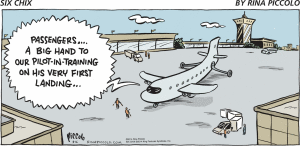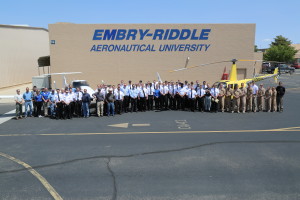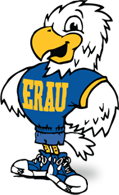Attention all future pilots!
So you want to become a pilot. Like myself, most of you probably want to become a professional pilot. Or maybe you just want to fly for fun. Whatever your story is, the road to becoming a pilot of any kind is long and winding, yet exciting and unforgettable. You will be challenged like never before, and your motivation will be put to the test. Despite this, I can guarantee you will have an amazing time throughout your training process. You will see things you’ve never seen before, try things you’ve never tried before, and feel things you’ve never felt before. I can say that my flight training journey has been an utterly unforgettable experience so far, and as I wrap up my commercial single-engine training and transition into multi-engine, I am more than excited to see what the next chapter of my story will include.
If you’re ready to embark on your flight training journey, there are a few things you should be familiar with in order to be successful as a student pilot. Here are six important things you must know in order to survive becoming an aviator:
#1: Find the Right Instructor
The most important person that you’ll work with throughout your training is, of course, your instructor! It is crucial that you find an instructor you know you’ll work
well with both on the ground and in the airplane. Ideally, your personalities should mix well and you should feel comfortable with your instructor’s teaching methods. A good instructor is a person who doesn’t intimidate you or make you feel stupid. If you are assigned to an instructor who clashes with your personality or your learning style, your training process will be slower and less enjoyable. If you don’t enjoy spending time with your instructor for any reason, don’t be afraid to switch to another instructor who will work better with you! You will find that working with the right instructor will make your training so much more productive and exciting.
#2: Communicate with your Instructor
If you don’t completely understand something for whatever reason, make sure you let your instructor know! He/she will gladly re-explain the topic to help you fully understand.
#3: Study Outside of Oral Lessons/Ground School
Perhaps just as important as finding the right instructor is making sure you study outside of your one-on-one ground lessons with your instructor. It may seem like a lot of work, but studying on your own will make training easier and faster. Simply taking notes while your instructor teaches a new topic just won’t “fly”. You must go home and review those notes you took, or get together with some friends and have a group study session in order to make that brand new information really stick. In addition, at the end of a lesson most instructors will give a preview into what you’ll be learning about next time. Use the time in between lessons to study up on the next topic. That way, once you meet with your instructor again, you’ll impress him/her with your newfound knowledge (not to mention it will make his/her job easier!) Studying outside of lessons will also decrease the money you spend for your training. The more you study, the less time you’ll have to listen to your instructor re-teach things you’ve already learned, and the less money you’ll have to pay!
#4: Use ALL Available Resources to your Advantage
Throughout your career as a student pilot, you will have countless resources at your fingertips to help you master whatever it is you’re currently studying for. Take advantage of them! All ERAU computers have the entire Gleim FAA Test Prep software to help you study for your FAA Knowledge Test. Over at the flight line, there are 3 Cessna 172 CPTs (Cockpit Procedure Trainers) to help you master those checklists, and multiple simulators that students can check out whenever they feel the need to get some practice without paying for the actual airplane. Not to mention your instructor will always be happy to answer any questions you might have!
#5: Fly as Much as You Can!
Make sure you keep your availability as open as possible so you can fly multiple times a week. The more frequent you fly, the better you’ll retain the skills you learn and the less you’ll have to repeat the lesson you’re on. Besides, who doesn’t want to fly several times a week?
#6: Don’t Forget What First Brought you to Flying
You’re training will get tough at times. You may even feel like giving up (I’ve sure been there). But it’s during these challenging times that you must remind  yourself why you decided to become a pilot in the first place. We were all bitten by the flying “bug” at some point, and as your training progresses, it gets pretty easy to forget why you were drawn in to the world of aviation. Think back to that first discovery flight you took, or the first time you saw an airplane up close. John Glenn once said, “I was sold on flying as soon as I had a taste for it.” What sold you on flying? Make sure you never lose sight of it
yourself why you decided to become a pilot in the first place. We were all bitten by the flying “bug” at some point, and as your training progresses, it gets pretty easy to forget why you were drawn in to the world of aviation. Think back to that first discovery flight you took, or the first time you saw an airplane up close. John Glenn once said, “I was sold on flying as soon as I had a taste for it.” What sold you on flying? Make sure you never lose sight of it





Greetings ERAU Team,
I’m working in Afghanistan and gearing up to complete my B.S. in Aeronautics online. But I’d also like to obtain my PPL and I’m trying to figure out my best options. I’m looking at military flying clubs in Germany and UT but I’m in the process of building (assembling) the Saitek flight simulator along with the Steam version of FSX. While not a real simulator maybe it will help me reduce flying time and ground school. If nothing else, it’ll be a stress reliever. With that being said, is there online training that I can do while overseas? From what I understand the PPL is something I need to pay out of pocket and then if I go commercial then I can use my GI bill. Once I get the PPL then I want to get twin engine type rated (your twin diesels look great) and no reason why I shouldn’t consider ERAU for all of my flight time. Max vacation time is 30 days and if I focus on the PPL next summer, then hit the commercial aspect starting June 2018 when our contract ends. So looking at the BS plus online ground school type education if the later is possible. Visited Prescott in Sept 2013, great campus.
Thank you for your time.
I love Helicopter’s. I want to be a pilot one day. I am 11, maybe I will come to Embry Riddle.
Hello ERAU,
I have been obsessed with flying passenger jets since I was 6 years old, I am now 14 and doing everything I can to obtain engineering credits and practicing proper flight procedures in aircraft such as the Boeing 737-800 and Bombardier Dash-8 Q400 in a home version of X Plane 11. The Prescott campus is where i would like to continue my education in the field of aviation. I hope I can go here someday too!
Can a student take up aeronautical science fixed wing, but also at some point be allowed to learn rotary wing flying?
Can one take up Aeronautical science for fixed wing but still have an elective to learn how to fly helicopters?
Good morning Faye, and thank you for reaching out to us with your question.
The answer is yes, students can major in one and minor in the other, and once you have one rating– either fixed wing or rotary wing– you can get the rating in the other simply by passing the check ride (hour minimums and written test requirements are waived).
However, you will still need to accumulate a significant number of flight hours in the other type of aircraft, so if this is your goal, you should plan on staying through the summers to fly, and perhaps may need an extra semester or two to graduate depending on your progression. Be sure to plan on the associated flight costs for both aircraft as well.
Naturally, you are always welcome to contact our offices and speak with an admission counselor if you should have any other questions. Call us anytime, Mon-Fri from 8am to 5pm at 928-777-6600, or toll-free 800-888-3728. You can also email us at prescott@erau.edu.
Thanks again Faye, and we hope to see you on campus soon!
Thank you for talking about all the resources available to flight students. I want to learn how to fly this year for fun. I will find an excellent flight training service nearby.
Wow! This is a great article! Thank you for sharing your journey. All of us have dreams in life, and none of them is easy. Knowing someone like you really inspires me.